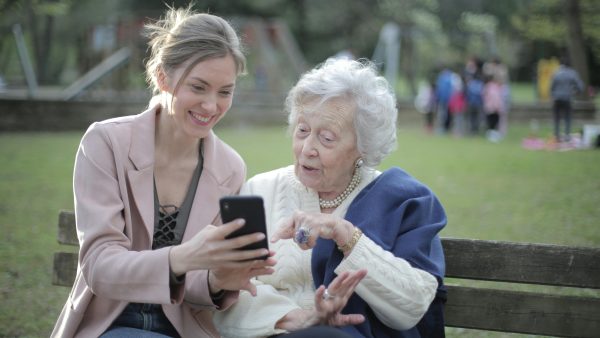My experience
That day, without meaning to, life taught me something that I had not yet realised: we were changing the way we relate to each other, despite being in a place with dozens of people communicating with people, many probably hundreds of kilometres away from where we were, and the closest and most vital form of communication, face-to-face, direct communication, was not perceived at all. I felt like I was on a desert island.
I left the internet café, pensive, I, a young telephone operator who, in my first professional experiences, dedicated myself in the most empathetic and diligent way possible to attending to our MoviLine and Movistar mobile phone customers, I neither understood nor had I realised until that very moment that a technology that connected us could also isolate us, and we were right at the dawn of the mobile phone in Spain, simple mobiles with green screens, we were not aware of all the advances that were yet to come…
Technology, like Telefónica’s mission, should make the world more human, connecting people’s lives. In our work we put technology at the service of people, those innovative solutions that should simplify our lives, but sometimes, if we use it badly, that technology also isolates and individualises us, taking us away from the most precious component of being human and bringing us closer to the coldness of machines.
More than 20 years have passed since that personal experience and things have evolved. We live a hyperconnected life, with a multitude of interactions with devices, all of them connected to the internet. Every day we are witnessing new ways of communicating, of working and of enjoying our free time. We live in an imbalance between real and virtual life, everything virtual and digital has become essential and necessary and, sometimes, consciously or unconsciously, it replaces spontaneity, naturalness and face-to-face interaction.
ICT and digitalisation should never replace reasoning, logic or human intelligence. This hyperconnectivity sometimes causes us technological fatigue and makes us resort to practising ‘techexit’, spaces and moments without technology.
My experience in the company
In my work, during my time in the Global Corporate Ethics and Sustainability Department as Responsible Business manager, I learned about the great work we do at Telefónica in one of the areas we were working on: the responsible use of technology. Educating about the responsible use of technology is important and necessary. We are more connected than ever but we cannot afford to lose our essence, to omit certain authentic and meaningful face-to-face interactions, live, without technology getting in the way. We must not disconnect from our own humanity or from others.
Technology is there to help us, it has to promote our well-being and we must preserve and guarantee our essence, the true, the real, the essence of touching and feeling and using the virtual and its advantages, but not for everything.
The new challenge
We face a new challenge with digitalisation and artificial intelligence, as many tasks that we used to carry out in person or manually are now being replaced by machines or virtual interactions. Together we have to ensure that this progress gives us more free time, more space to create, think and innovate, to improve ourselves and not the opposite, and to encourage collaboration between people, avoiding the new risks that threaten us in the cyber world. Unfortunately, we have also transferred mischief to the virtual world.
Excessive dependence on technology can lead to a certain degree of social isolation and individualism, reducing collaboration between people, human contact, even diminishing face-to-face communication skills. We are, without a doubt, as Aristotle already said, social beings by nature and we need others to survive. Let’s be intelligent and learn to keep the good things about digitalisation, which are many, and ignore the negative and absurd.
And thinking about the more immediate technological future, if we dream, where will we be in another 20 years? Will we have achieved teleportation? Where will AI have taken us? A kind of vibrant sensation runs through my body, and I think about what we have yet to see… Let’s make the most of the digital experience without forgetting what makes us human: values, relationships and the power of our imagination.











